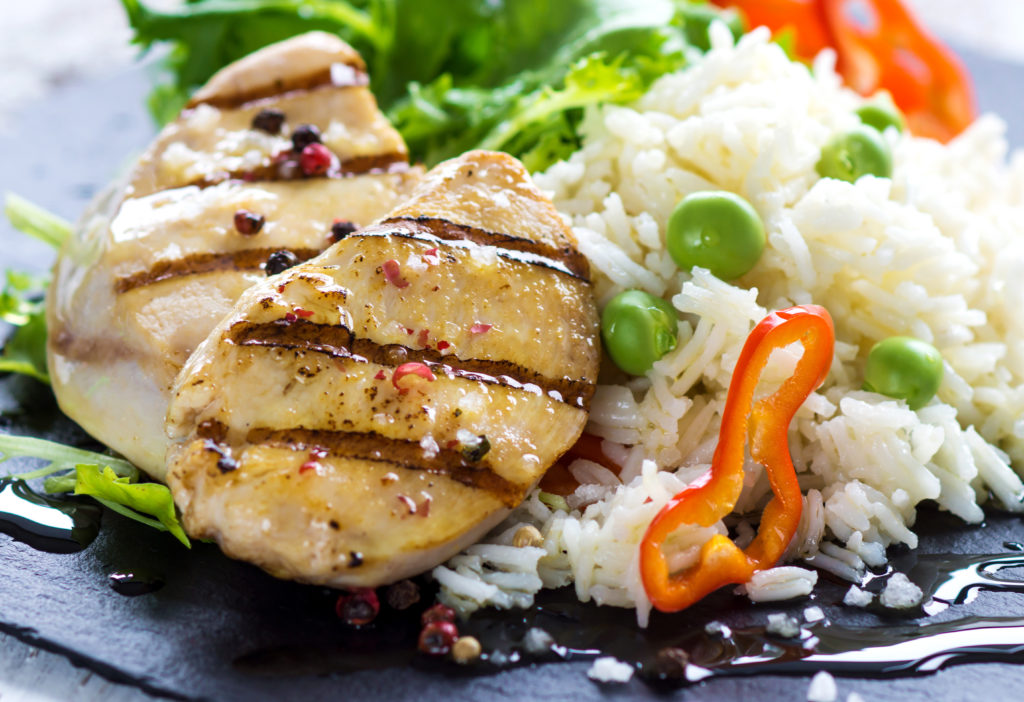Garder sa masse musculaire pendant le Ramadan
Beaucoup de pratiquants de musculation qui passent de longues heures à bâtir leurs muscles avec acharnement à la salle sont bien souvent inquiets de perdre leur masse musculaire pendant le mois de Ramadan.
En effet, les longues heures de jeûne peuvent avoir un effet catabolique sur la masse musculaire durement acquise, et l’on finit bien souvent le Ramadan avec du muscle en moins. Toutefois, il est possible de limiter ce catabolisme en adaptant au mieux sa stratégie nutritionnelle pendant le Ramadan.
Pourquoi catabolise t’on ?
La raison est simple, c’est ce que j’appelle avec humour de l’auto-cannibalisme : lorsque vous ne mangez rien, et en particulier lorsque vous n’ingérez pas de glucides, qui sont le carburant du corps, votre corps a besoin de trouver un substitut à ceux-ci pour fonctionner.
Le corps va donc se mettre à dégrader les acides aminés composant les protéines musculaires (catabolisme) pour s’en servir de carburants : en effet les acides aminés protéinogènes (composant les blocs de protéines) peuvent être utilisés par le corps à des fins énergétiques dans une période de jeûne prolongé. C’est donc ce qui finit par se passer pendant le mois de Ramadan : le jeûne prolongé déclenche ce processus et l’apport calorique moindre par rapport à nos habitudes fait que l’on ne peut en plus pas entretenir sa masse musculaire.


Peut-on y remédier ?
Y remédier totalement me paraît impossible, surtout dans les années ou la durée du jeûne est supérieure à 14h. Le processus de dégradation des protéines musculaires est un processus naturel programmé dans la physiologie de l’être humain. On n’y peut rien, c’est comme ça.
Toutefois, si l’on ne peut pas éviter ce catabolisme, on peut en contrebalancer les effets en tentant de maximiser les effets anaboliques de la nutrition. C’est ce que je vais vous expliquer ci-dessous en vous donnant quelques astuces qui vous permettront de limiter la perte de votre masse musculaire chèrement acquise :)
- Maximisez les apports en protéines
Même si vous aimez la nourriture traditionnelle (harira/chorba, les gâteaux typiques …) vous devez aussi penser à ne pas négliger vos apports en protéines, surtout si vous faites partie de ceux qui continuent à vous entraîner pendant le Ramadan.
Pensez donc à toujours inclure une source de protéines dans vos repas du Ramadan, surtout celui du Ftor qui est le premier repas, donc celui qui va casser le jeûne et amener des acides aminés à vos muscles en demande, donc vous sortir du catabolisme.

On doit donc au cours de vos repas du Ramadan toujours trouver une source de protéines sous forme de :
- Viande blanche (on va bannir la rouge en général, plus lourde à digérer)
- Poissons
- Oeufs
- Légumineuses (pour les végétariens)
- Proteines en poudre, de préférence un isolat ou une caserne avant de reprendre le jeûne (moins nourrissant mais tout aussi efficace si la protéine est de bonne qualité)
Pour améliorer l’assimilation des protéines, le pic d’insuline généré par les dattes sera un plus non négligeable :)
En ce qui concerne les glucides (nécessaire pour refaire vos stocks de glycogène notamment, fortement diminués par le jeûne) incluez une source de glucides complexes (riz, semoule, blé, quinoa, patate douce …) et/ou un fruit selon votre appétit.
Les lipides quant à eux proviendront d’huiles riche en Oméga 3 : huile de colza, pépins de raisin, d’olive ….
2) Ne négligez pas certains compléments alimentaires
Ici, un élément qui peut réellement selon moi faire une réelle différence en terme de limitation de perte de la masse musculaire, c’est la prise de compléments alimentaires, notamment :
Les BCAA (Branched Chained Amino Acids) : Ils sont au nombre de 3 et ont pour particularité de déclencher et améliorer la synthèse protéique (la synthèse par le corps des protéines pour reconstruire les muscles notamment) mais aussi d’améliorer l’utilisation du glucose par le corps.Leur intérêt est immense pendant le Ramadan : en effet, il est essentiel de potentialiser la synthèse de la moindre protéine consommée dans le temps imparti pour manger.
Les EAA (Essential Amino Acids) : Ils sont au nombre de 9 et leur apport exogène est capital car ils ne sont pas fabriqués par le corps et représentent 9 des 20 acides aminés qui composent un bloc de protéines. Et comme on le sait déjà, pas de protéines = pas de muscles :)
De l’isolat de whey protéine : lorsque le temps imparti pour manger est court, on se retrouve souvent à consommer des repas proches et on n’a pas forcément l’appétit suffisant pour pouvoir reprendre un repas alors que le précédent date d’il y a à peine 2 heures. Dans ce cas, l’isolat est le choix parfait de substitut de repas de par sa vitesse rapide d’assisimilation.
De la caséine : La caséine, qui est l’autre type de protéine (avec la whey) extraite du lait, a une particularité qui la rend tout à fait intéressante pour la consommer juste avant la reprise du jeûne, c’est sa vitesse d’assimilation : en effet, contrairement à la whey qui est rapidement assimilée par le corps, la caséine est quant à elle digérée beaucoup plus lentement, permettant une libération plus lente d’acides aminés même lorsque le jeûne aura repris.
Les Oméga 3 : Je recommande aussi de supplémenter en Oméga 3 (moins présent dans la nourriture que les Oméga 6)Même si ceux-ci n’impactent pas directement votre prise/perte de muscle, leur carence peut avoir des répercussions sur le système nerveux par exemple. Une dose de 1000-1500mg par jour est correcte.
Une bonne hydratation et un équilibre parfait des électrolytes sont nécessaires à une bonne contraction musculaire.
Après de longues heures de jeûne, vous êtes (au moins partiellement) déshydratés, par conséquent il est absolument nécessaire de vous réhydrater (boire de l’eau) mais je trouve qu’il est peut être intéressant de consommer aussi une boisson de l’effort du type Gatorade dans le temps imparti pour manger. Cela vous permettra d’éviter les effets désagréables de la déshydratation.
Et si jamais vous commencez à être victime de crampes, prenez 1 gramme de sel d’Himalaya avant la reprise du jeûne, vous verrez que ça passera vite :).

En conclusion, il est possible selon moi d’économiser de la masse musculaire même lorsque l’on fait le Ramadan.
Je vous ai ici donné les clés pour cataboliser le moins possible, toutefois gardez présent à l’esprit que des variables telles que votre degré d’activité (sédentaire ? actif ?) par exemple, pourront influer sur la vitesse où votre masse musculaire se dégradera.
Mais, comme je le répète toujours, ne vous en faites pas pour ça, le mois de Ramadan est un mois spirituel. Une fois ce mois passé et après le retour à un rythme d’alimentation normal, vous vous rendrez vite compte qu’il y a un effet « rebond » et que la mémoire musculaire n’est pas qu’une légende, vous retrouverez vite votre niveau d’avant, voir même vous le dépasserez !
 Offre spéciale : Les 4 premières semaines à 19€
Offre spéciale : Les 4 premières semaines à 19€




